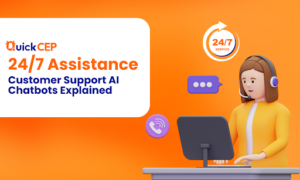In today’s cutthroat e-commerce world, the secret weapon for success might be hiding in plain sight: chatbots. Why? Chatbots are quick, intelligent, and reliable tools that can provide support at scale with the least amount of resources. Unlock explosive growth and surging profits! Discover how these AI-powered assistants can revolutionize your customer experience and skyrocket your bottom line.
How Do Ecommerce Chatbots Work?
Ecommerce chatbots serve as “automated virtual representatives” that face your customers and tend to their questions, requests, or complaints about your products or services. When customers “talk” with an e-commerce chatbot, it will respond based on its training data (if it’s AI-powered) or predefined script dialogues (if it’s rule-based).
Scenario
Say that a customer wants to inquire about a vacuum cleaner your store offers. Unfortunately, it’s already beyond business hours so no support rep can entertain them. Your customer can go directly to your site and ask your chatbot. With the chatbot, they were able to provide detailed product descriptions, specifications, prices, and options for vacuum cleaners your store is offering, and they can also read FAQs about the products.
Types of Ecommerce Chatbots
We can classify e-commerce chatbots as traditional (manually programmed using rules or scripts) or AI-powered (developed using machine learning algorithms and LLM models). We can also “mix” these two chatbot types to come up with a hybrid one.
AI-powered Chatbots
- Natural Language Processing: A technology that uses statistical learning models to comprehend words and language structures to enable chatbots to carry out human conversations.
- Machine Learning (ML): A set of algorithms that enables the chatbot to learn from data. ML algorithms will explore data patterns, eventually teaching themselves to mimic human cognition.
Instead of canned or scripted dialogues, AI chatbots can “think” of relevant responses tailored to the current conversation. This approach provides customers with a unique and personalized experience  QuickCEP’s AI-powered chatbots can interact with customers and respond to their questions anytime in a conversational fashion. These multilingual chatbots can also give personalized product recommendations, track real-time order status, and provide after-sales support to customers. QuickCEP’s chatbots are also trained to perform intent analysis, so they can provide real-time insights about a customer’s view or perception about your products.
QuickCEP’s AI-powered chatbots can interact with customers and respond to their questions anytime in a conversational fashion. These multilingual chatbots can also give personalized product recommendations, track real-time order status, and provide after-sales support to customers. QuickCEP’s chatbots are also trained to perform intent analysis, so they can provide real-time insights about a customer’s view or perception about your products.
Rules-based Chatbots
Rule-based chatbots use predefined rules, templates, or scripts to respond to input. These chatbots are not actually “thinking” but follow only a static, coded decision tree or conversation flowchart in response to an input. Hence, they’re less flexible and less conversational compared to AI-driven chatbots. However, rule-based chatbots provide more controlled and predictable responses because they stick and operate only within the rules they’re built upon.
Hybrid Chatbots
Hybrid chatbots combine the conversational and personalized approach of AI chatbots and the scripted, predictable structure of rule-based chatbots. These chatbots can adapt quickly from simple and structured questions (using scripted responses) to more complex requests (using AI).
4 Benefits of Using Ecommerce Chatbots
Supercharge your online store with the magic of e-commerce chatbots! These AI-powered assistants are more than just conversation starters—they’re customer service superheroes. Here are some upsides of implementing e-commerce chatbots:
1. Improve Customer Service
A 2023 study found that AI chatbots’ conversational quality positively impacts customer satisfaction. It’s hardly a surprise as AI chatbots can assist almost instantly while providing a conversational and personalized experience to users. For instance, e-commerce chatbots can find the product you’re looking for in seconds. Or, if you’re unsure what to pick from a catalog of 1,000 products, the chatbot can advise one that fits your preferences and interests. Chatbots can also provide 24-hour support, ensuring customers that someone is always ready to assist them. With chatbots’ scalability and speed, customers don’t need to suffer in frustrating waiting queues just to ask for support. Most chatbots support integration with platforms that e-commerce stores use to connect with customers. For example, QuickCEP’s AI chatbots can engage customers in Instagram, Facebook Messenger, email, and Shopify.
2. Answer FAQs、
Chatbots are designed to efficiently handle frequent customer questions like product availability, shipping details, refunds, and discounts. Although customers can find answers in your FAQ articles, it’s more convenient if a chatbot can rapidly retrieve the information they need. Look how SmartOutfit Bot powered by QuickCEP provides return and request for replacement instructions to a customer.  You can use an e-commerce chatbot yourself! Sign up for an account at QuickCEP and start automating your customer service today for FREE!
You can use an e-commerce chatbot yourself! Sign up for an account at QuickCEP and start automating your customer service today for FREE!
3. Generate and Automate Sales
Many online stores are using chatbots to initiate conversations with website visitors and capture their intent and preferences. These chatbots qualify or segment potential customers for product recommendations, personalized upselling, or cross-selling to generate sales for your business. You can also automate reminding customers about their abandoned carts or offer discount promos and coupons to entice them to make a purchase. Most chatbots are capable of collecting essential data over conversations to extract trends and insights about customers’ behavior and preferences. For example, an AI chatbot can recognize the most inquired or purchased products of the month and recommend them to future customers. Moreover, e-commerce chatbots are valuable for maintaining customer retention by providing reliable after-sales support. Chatbots can help shoppers track their order shipment, ask for product return or refund, request for repair or warranty, or assist in troubleshooting problems. Look how an AI-powered chatbot developed by QuickCEP can track the real-time status of an order: 
4. Reduce Costs
Adopting an e-commerce chatbot is like hiring additional support reps or sales specialists but at a fraction of the cost. Using an e-commerce chatbot will only cost you a few dollars per month, but additional employees need monthly compensation and benefits (not to mention salary increases!).
How Ecommerce Chatbots Level-Up Your Online Store?
 Ecommerce chatbots offer one-stop solutions to level up your customer support, sales, and lead generation. They can operate 24/7 with consistent quality and speed, managing multiple workflows such as responding to customer questions, engaging website visitors, assisting in purchase journeys, and providing personalized recommendations. By receiving top-notch, convenient support from e-commerce chatbots, customers are most likely to remain loyal to your brand and continue supporting your store.
Ecommerce chatbots offer one-stop solutions to level up your customer support, sales, and lead generation. They can operate 24/7 with consistent quality and speed, managing multiple workflows such as responding to customer questions, engaging website visitors, assisting in purchase journeys, and providing personalized recommendations. By receiving top-notch, convenient support from e-commerce chatbots, customers are most likely to remain loyal to your brand and continue supporting your store.
Adopt the Best Ecommerce Chatbot Today for Business Growth
Chatbots are now a staple in e-commerce in driving sales and providing high-level customer support For guaranteed growth, it’s crucial to pick a chatbot that can provide accurate and helpful information to customers using personalized and conversational interactions. Try QuickCEP’s AI chatbots today for free and add an AI-powered conversational chatbot for your business’ enhanced sales and support service. Online Store?/p>



